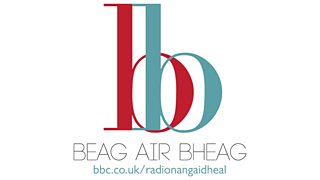Oisean a’ Ghrà mair Sreath 11: 3
CRIOMAG: Rosemary Ward (‘Leugh Mi’)

PUING 1. AS MOTHA: ‘the most, mostly’
Rosemary:
“’S e ficsean as motha a tha a’ toirt tlachd dhomh.”
“It’s fiction gives me most pleasure.” (‘It’s fiction most gives me pleasure.’) “It’s fiction I enjoy most.”
* Thoiribh an aire do òrdugh nam faclan (word order).
’S e Raonaid an leabhar Gàidhlig as motha a thug buaidh oirre nuair bha i òg.
‘Raonaid is the Gaelic book that most influenced her, that had the most impact on her, when she was young.’
’S e Gàidhlig as motha bhios iad a’ bruidhinn ris a’ chloinn.
‘It’s mostly Gaelic they speak to the children’, ‘It’s Gaelic they speak most to the children.’
Is toil leam rugbaidh, ach ’s e ball-coise as motha a bhios mi coimhead.
‘I like rugby, but it’s football I watch most.’ (‘it’s football the most I watch’)
’S i briogais as motha a bhios i a’ cur oirre.
‘It’s trousers the most she puts on’, i.e. ‘She mostly wears trousers.’
Dè am baga as motha a ghabhas?
‘Which bag takes most?’ (‘most takes’)
PUING 2. ...far a BHEIL, far an ROBH ‘where I am, where I was’
Rosemary:
“Nuair a thàinig Raonaid a-mach an toiseach, tha mi creidsinn gu robh mise aig ìre na mo bheatha far an robh mi gam cheasnachadh fhèin dè an t-slighe a bha mi a’ dol a ghabhail.
“When Raonaid first came out, I think I was at a stage in my life, where I was questioning myself / asking myself what path I was going to take.”
Tha mi - ‘I am’, ach:
Chan eil mi - ‘I’m not’, A bheil mi? - ‘Am I?’, Càit a bheil mi? - ‘Where am I’, ...far a bheil mi ‘...where I am’.
(bh)eil : riochd eisimeileach, dependent form)
Bha mi - ‘I was’, ach:
Cha robh mi - ‘I wasn’t’, An robh mi? - ‘Was I?’, Càit an robh mi? - ‘Where was I’, ...far an robh mi - ‘... where I was’.
(robh: riochd eisimeileach, dependent form)
An e sin an club far an robh sinn an-raoir?
‘Is that the club where we were last night?’
Fuirich far a bheil thu.
‘Stay where you are’.
Tha i aig ìre far a bheil i a’ ceasnachadh a h-uile sian.
‘She’s at a stage where she’s questioning everything.’
PUING 3: Riochdan cùmhnantach | Conditional forms: Rachainn, Rachadh tu
‘I would / I could’: –INN, –AINN
Rosemary
“Gu h-onarach, chanainn gur e ficsean as fheàrr leam.”
“To be honest, I would say it’s fiction I prefer, fiction’s my favourite.”
“Sin, mar gum biodh, an rud a thogainn nan tiginn fhèin a-steach gu bùth leabhraichean.”
“That’s so to speak the thing I would pick up if I were to come (if I came) into a bookshop.”
Bhithinn - ‘I would be’
Chanainn - ‘I would say’
Dhèanainn - ‘I would do’
Rachainn - ‘I would go’
Shaoilinn - ‘I would think, I’d expect’
Thogainn - ‘I would lift’
‘You would / You could’: –adh TU
Rosemary:
“Ach mar a shaoileadh tu ann an sgeulachd sam bith a tha a’ dol a tharraing, mar gum biodh, ùidh òigridh...”
“But as you would expect in any story that’s going to attract the interest of the young, (/ that’s going to appeal to the young), as it were, ...”
“Bha dà roghainn ann: rachadh tu dhan oilthigh no rachadh tu a nursadh.”
“There were two choices: you could go (you would go) to university or you could go into nursing.”
Bhitheadh / Bhiodh tu - ‘You would be’
Chanadh tu - ‘You would say’
Dhèanadh tu - ‘You would do’
Rachadh tu - ‘You would go’
Shaoileadh tu - ‘You would think, I’d expect’
Thogadh tu - ‘You would lift’
PUING 4: a’ dol a + sèimheachadh | ‘going to’ + lenition
(Faic Oisean 2, Puing 4.)
Rosemary:
“Nuair a thàinig Raonaid a-mach an toiseach, tha mi creidsinn gu robh mise aig ìre na mo bheatha far an robh mi gam cheasnachadh fhèin dè an t-slighe a bha mi a’ dol a ghabhail.”
“When Raonaid first came out, I think I was at a stage in my life, where I was questioning myself about / asking myself what path I was going to take.”
“Ach mar a shaoileadh tu ann an sgeulachd sam bith a tha a’ dol a tharraing, mar gum biodh, ùidh òigridh...”
“But as you’d expect in any story that’s going to attract the interest of the young, as it were (/ that’s going to appeal to the young),...”
Tha iad a’ dol a sheinn. ‘They’re going to sing.’
Bha mi a’ dol a thoirt dhut preusant. ‘I was going to give you a present’.
Chan eil seo a’ dol a tharraing òigridh. ‘This isn’t going to attract young people.’
Le fuaimreag (vowel) no fh + fuaimreag: a dh’
Bha sinn a’ dol a dh’èisteachd riutha làrna-mhàireach.
‘We were going to listen to them the next day.’
Tha a’ chlann a’ dol a dh’fhaighinn reòiteagan.
‘The children are going to get ice-creams.’

